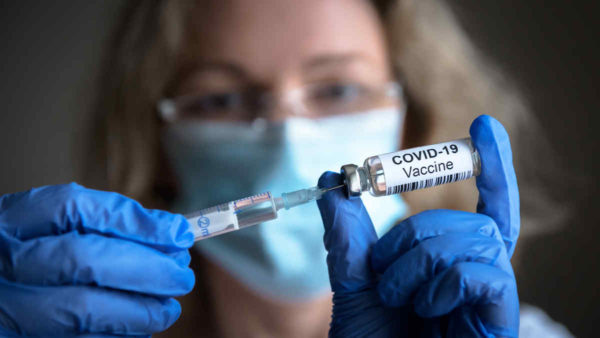

UPDATED: ORIGINAL:
In 1901 a deadly smallpox epidemic tore through the Northeast, prompting the Boston and Cambridge boards of health to order the vaccination of all residents.
But some refused to get the shot, claiming the vaccine order violated their personal liberties under the Constitution.
One of those holdouts, a Swedish-born pastor named Henning Jacobson, took his anti-vaccine crusade all the way to the U.S. Supreme Court.
The nation’s top justices issued a landmark 1905 ruling that legitimized the government’s authority to “reasonably” infringe upon personal freedoms during a public health crisis by issuing a fine to those who refused vaccination.
In 1901, the city of Boston registered 1,596 confirmed cases of smallpox, a highly contagious, fever-inducing illness infamous for causing a severe rash on the face and arms that often left survivors scarred for life.
In Boston alone, 270 people died from smallpox during the extended 1901 to 1903 outbreak.
That’s why public health officials in Boston and neighboring Cambridge issued their compulsory vaccination orders, hoping to reach the 90 percent vaccination rate required for herd immunity.
Jacobson, who served as the pastor of a Swedish Lutheran church in Cambridge, had been vaccinated against smallpox in Sweden when he was 6 years old, an experience that he later said caused him “great and extreme suffering.”
So when Dr. E. Edwin Spencer, chairman of the Cambridge Board of Health, knocked on the Jacobsons’ door on March 15, 1902, the pastor refused vaccination for himself and his son.
A few months later, Cambridge was in a full-fledged smallpox “panic” with the city ordering the closure of all schools, public libraries and churches to stem the spread of the disease.
Police officers accompanied health officials like Spencer, who went door to door vaccinating as many as 100 people a day.
But while the Cambridge vaccine order was compulsory, it wasn’t a “forced” vaccination. People like Jacobson who refused to get vaccinated faced a $5 fine, the equivalent of nearly $150 today.
On July 17, 1902, Dr. Spencer issued a criminal complaint against Jacobson and other anti-vaccine activists to collect that $5 fine.
Jacobson Goes to Court Amid Anti-Vaccination Uproar
The broader battle over the validity of vaccination science reached a fever pitch during the smallpox outbreak.
Anti-vaccination groups, citing alleged cases of death and deformity from bad reactions to smallpox vaccine, called compulsory vaccination “the greatest crime of the age,” claiming that it “slaughter[s] tens of thousands of innocent children.”
In response, newspaper editorials characterized the smallpox vaccination controversy as “a conflict between intelligence and ignorance, civilization and barbarism.”
The New York Times dismissed anti-vaccine activists as “a familiar species of cranks” who were “deficient in the power to judge [science].”
It was against this heated backdrop that Jacobson fought his $5 fine, first in a state trial court and then by appeal in the Massachusetts Supreme Judicial Court.
Jacobson wanted to present evidence that vaccines themselves were dangerous and ineffective, but the judges wouldn’t hear it.
Instead, Jacobson’s chief argument became, “Compulsion to introduce disease into a healthy system is a violation of liberty,” specifically the personal liberty he believed was guaranteed by the U.S. and Massachusetts constitutions.
more recommended stories
 Fentanyl Seizures at Border Continue to Spike, Making San Diego a National Epicenter for Fentanyl Trafficking
Fentanyl Seizures at Border Continue to Spike, Making San Diego a National Epicenter for Fentanyl TraffickingFentanyl Seizures at Border Continue to.
 Utah Man Sentenced for Hate Crime Attack of Three Men
Utah Man Sentenced for Hate Crime Attack of Three MenTuesday, August 8, 2023 A.
 Green Energy Company Biden Hosted At White House Files For Bankruptcy
Green Energy Company Biden Hosted At White House Files For BankruptcyAug 7 (Reuters) – Electric-vehicle parts.
 Former ABC News Reporter Who “Debunked” Pizzagate Pleads Guilty of Possessing Child pδrn
Former ABC News Reporter Who “Debunked” Pizzagate Pleads Guilty of Possessing Child pδrnFriday, July 21, 2023 A former.
 Six Harvard Medical School and an Arkansas mortuary Charged With Trafficking In Stolen Human Remains
Six Harvard Medical School and an Arkansas mortuary Charged With Trafficking In Stolen Human RemainsSCRANTON – The United States.
 Over 300 People Facing Federal Charges For Crimes Committed During Nationwide Demonstrations
Over 300 People Facing Federal Charges For Crimes Committed During Nationwide DemonstrationsThe Department of Justice announced that.
